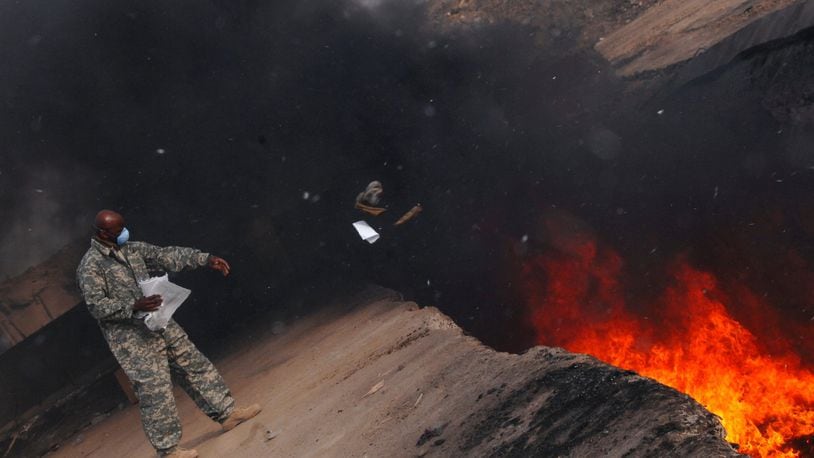In March 2017 her son-in-law, who she will not name to preserve his medical privacy, was diagnosed with Stage 4 non-small cell adenocarcinoma — a type of lung cancer that has no primary tumor and is extremely difficult to treat. He is 37 and has a four year old daughter. In Iraq, he had a job that put him outside, near a burn pit that helped dispose of everything from everyday trash to chemicals to medical waste to pesticides to asbestos to human remains.
On Thursday, as she stood on Capitol Hill with others affected, Zeier held a sign, picturing her granddaughter. “Tell her that burn pits aren’t the reason her daddy is dying,” the sign read.
Hours later Zeier, wearing her son-in-law’s Army coat, sat with veterans wearing surgical masks and family members who had lost loved ones to lung diseases and other ailments after returning from Iraq and Afghanistan as lawmakers debate the role of burn pits on the health of those who served in Iraq and Afghanistan.
“These burn pits are the Agent Orange of the post-9/11 generation of veterans,” said Rep. Tulsi Gabbard, a Hawaii Democrat, referring to the toxin that affected Vietnam veterans. Gabbard, an Iraq War veteran, ruefully recalled seeing fellow service members who lived and worked near the burn pits sick with something they called “the crud” – a hacking, wheezing lung infection that was widespread.
In 2014, the Department of Veterans Affairs created an “Airborne Hzards and Open Burn Pit Registry,” where veterans can self-report health conditions that might be related to environmental exposures experienced during deployment. But only 141,000 have completed the registry out of the 3.5 million veterans that the VA says are eligible, according to Tom Porter, legislative director of the Iraq and Afghanistan Veterans of America. He said because the registry is not well known and is underused, there’s not enough data to feed the urgency required. His organization is pushing a bill that would direct the Defense Department to include in its periodic health assessments an evaluation of whether a service member has been exposed to open burn pits or toxic airborne chemicals.
RELATED: New task force to help military, veterans, civilians battle dementia
“Veterans deserve to know what is making them sick,” said Ken Wiseman, associate legislative director at the Veterans of Foreign Wars of the United States, testifying before the House Veterans Committee’s Subcommittee on Health Thursday.
Subcommittee chair Neil Dunn, R-Calif., questioned whether the veterans suffering from health problems might be dealing with “an inflammatory reaction to the local environment.”
He said he feared the “narrow focus” on burn pits might cause researchers to ignore “particulate matter” as well as other unknown pathogens “that could have an even greater risk to those deployed in the Middle East.”
Other lawmakers were more alarmed.
“Who’s the genius who came up with this idea?” asked Rep. Clay Higgins, a Louisiana Republican who questioned why burn pits were used at all. “We’ve essentially as a nation delivered chemical and biological weapons upon our own troops.”
He and other lawmakers expressed dismay that the Department of Defense ducked an invitation to appear at the hearing.
To Zeier, the issue is a no-brainer: You don’t have to be a doctor to know that burning toxins can cause people to get sick, she said.
She remembers when her son-in-law was first diagnosed. The cancer was so rare, she said, that the doctor wept. “What the hell were you exposed to?” the doctor asked her son-in-law.
Now, she said, her son-in-law is fighting for his life. Her daughter is working to take care of him and her daughter. She tries to help them, but it’s a lot to handle.
“I just want them to acknowledge that they did this,” she said of the military. “They did this.”
About the Author
